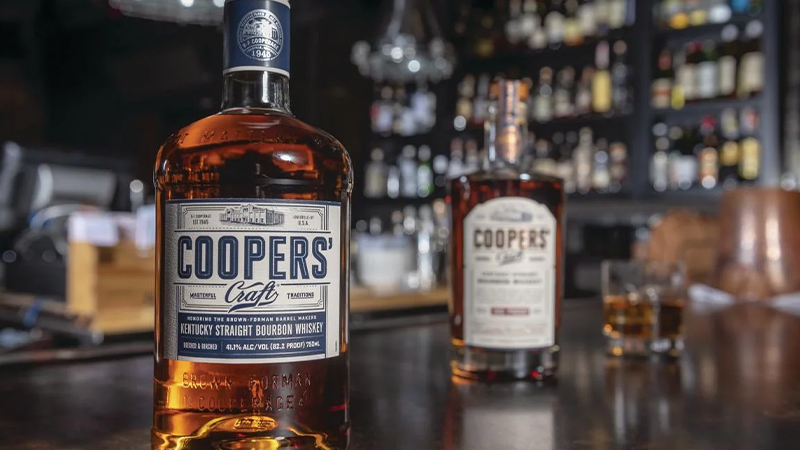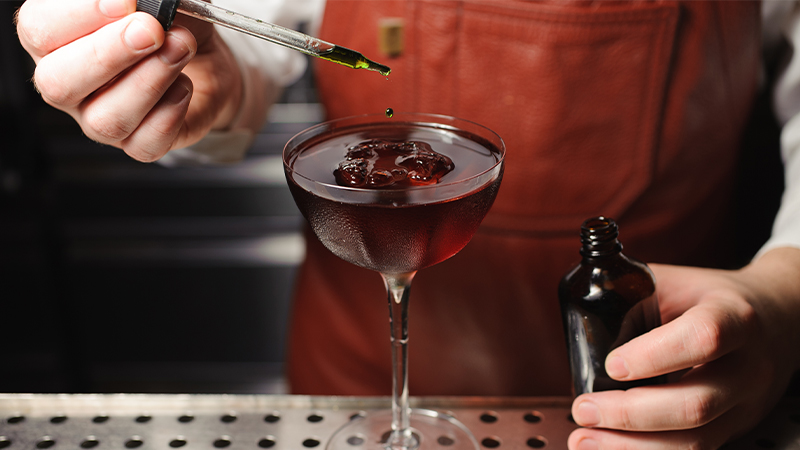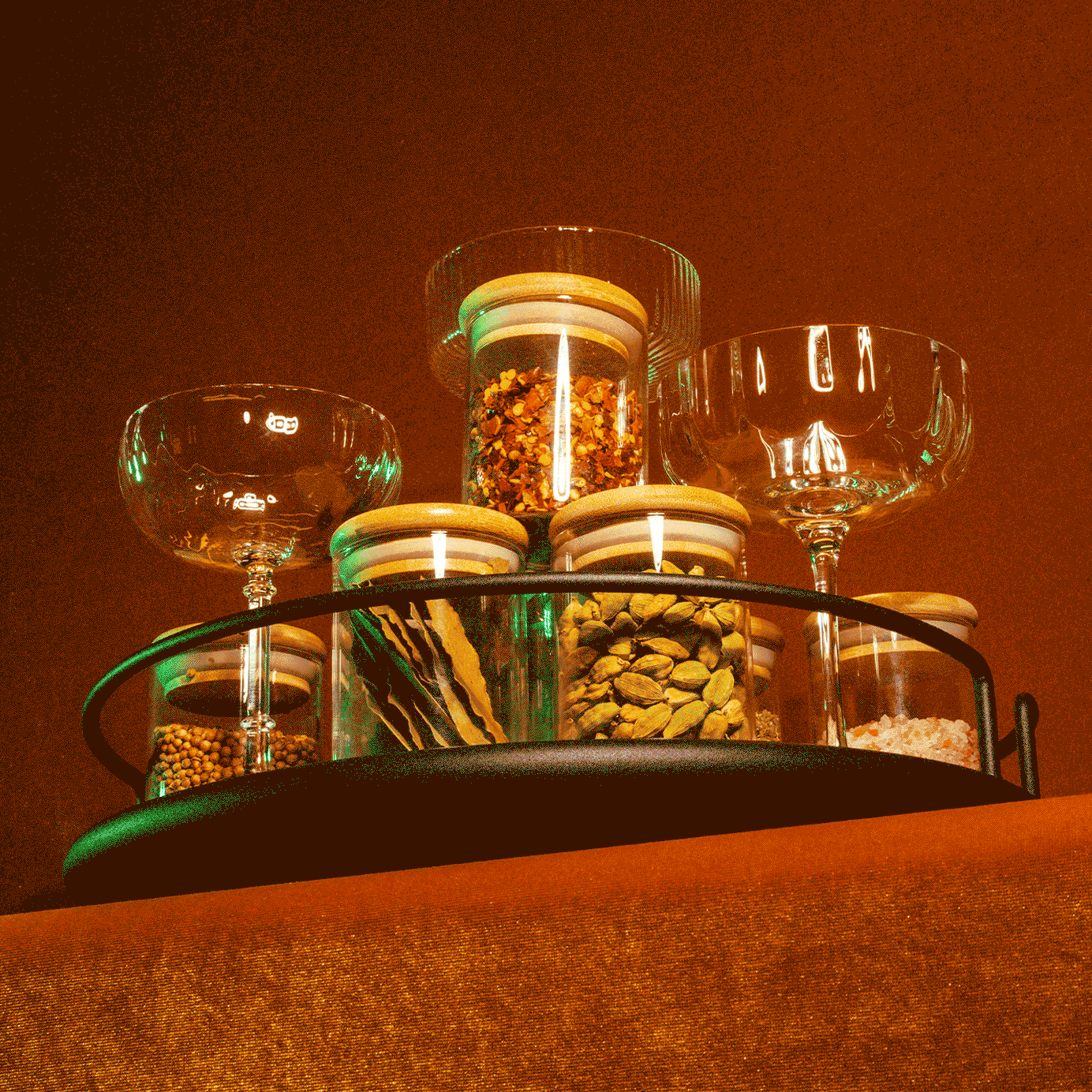To create a uniquely flavored, multi-textural cocktail, adding bitters is a must. Bitters help to align flavors and are to cocktails what spices are to food: They add aromatic enhancements and bring nuanced flavors to the final product.
“Bitters are the salt and pepper of cocktails,” says Guy Jackson, mixologist at Hush at Montage Palmetto Bluffs in Bluffton, S.C. “A little bit can go a long way, and just like spices, you can mix different bitters to get different effects.”
While it can be oh so easy to simply run to the store and pick up a bottle, creating your own bitters from scratch allows for particularly unique, personalized cocktails. In fact, the flavor additive you have been looking for may already be sitting on your spice rack — all you need is a spirit, some spice, and a little bit of imagination.
“Though there are many choices on the market today for quality bitters, they can’t cover all flavors,” Jackson says. “Making your own allows you to fine-tune your bitters.”
Getting Started
Before reaching for the spices and herbs in your cabinet, first choose a liquor that won’t overpower their flavors. “The best thing to start is going to be a high-proof, neutral flavor,” says Fitz Bailey, mixologist and brand ambassador for Coopers’ Craft Bourbon.
Look for a spirit that’s at least 150 proof to ensure the highest concentration of flavor (for example, you’ll want to use a 150 proof liquor if you’re making your own vanilla bean extract), although dropping to 100 proof works well for less intense flavors. Bailey notes that vodkas and Everclear tend to work best when making any type of bitters, no matter if you’re looking for a deep walnut flavor to enhance your Manhattan or Old Fashioned, or if you’re wanting to add a jalapeño-lime kick to your Margarita. Both lighter and more complex bitter combinations benefit from the use of a clear spirit that doesn’t have competing flavors (which is why tequila, gin, and rum are not recommended).

That said, there is room for bourbon to act as a backdrop for your blend. Bourbon can enhance bitter infusions such as vanilla, orange, cherry, chocolate, and other flavors typically found in whiskey-based cocktails. Which bottling you use is completely up to personal preference; take into account the undertones of the bourbon you select, and infuse herbs and spices with complementary essences. Using a flavor wheel can help you to decide which tastes to enhance and which to downplay.
“Say you wanted to make some chocolate bitters: What’s great is that all you have to do is look up a chocolate flavor. So cacao, you would definitely want that for chocolate. But then you have other flavors like cinnamon, vanilla bean, and even wild cherry bark if you want to go a little crazy,” Bailey says. “Using a flavor wheel is a good way for you to experiment — especially if you’re a first timer.”
Spice It Up
“Generally speaking, there is a base of ‘bitter’ spices that are common in a lot of bitters,” says Jackson. Some of these include gentian, a super-bitter root that’s found in many aromatic bitters; cinchona bark, which contains quinine; wormwood, the star ingredient in absinthe; aromatic angelica root; mildly bitter artichoke leaf; and cassia chips, a bark from the cinnamon family.
Jackson says that when deciding what kind of bitters to make, you’ll want to think about what will complement or even add to the flavors in your favorite cocktails — traditional or not. Jackson notes that star anise, lemongrass, peppercorns, and juniper berries are a few of his picks for making his own bitters, which he uses in many of the cocktails he makes both at home and at Hush.
Bailey goes a little bit more traditional. He favors cinnamon, cardamon, and Chinese five spice for his creations, but he isn’t one to shy away from something a bit more intriguing.
“A lot of the baking spices are really good, depending on what kind of drink you want. And then you also have some with really wonderful, bitter elements. If you were going to do a Boulevardier or Negroni, you might want to use ginseng root spices or cassava chips to accentuate the flavors,” Bailey says.
While fresh is always best, you can also feel free to use ground spices — although there are a few rules of thumb to take into consideration. As one may expect, fresh spices will give you a hefty amount of flavor in a shorter amount of time, but ground spices will still end up packing a punch. However, they will need to be heavily strained out — and even then, you still may have some particles leftover. These particles will continue to infuse and strengthen the bitters as time goes on, which is something to take note of if you’re not planning on using them quickly.
And, notes Jackson, while you may be focused on spices, don’t forget how valuable herbs and citrus piths can be, both as a base and as an enhancement. He recommends rosemary, thyme, fennel, mint, and coriander to add dimension to your at-home bitters experiment.
Master Your Technique
Making bitters is really not all that difficult — it just takes patience (and maybe some thyme!). Just stock up on a few jars, some cheesecloths, neutral spirits, and bittering agents. After that, it’s a piece of cake.
“The good news is that it doesn’t require a lot of attention once it’s put together; just an occasional shake every once in a while,” Jackson says. “After adding all your ingredients to the jar with the alcohol, place it on a shelf out of the way and let the alcohol do its job, which is extracting the flavor from the ingredients — no refrigeration required.”
Bailey says that tasting along the way is also key to getting a great result — the bitters are ready when your palate says they are. And, if you happen to forget about your concoction and allow the infusion process to go on too long, it can often be salvaged or even turned into a syrup.
“If you end up with something too bitter, you could then go in and start adding some simple syrup to sweeten it,” he says. “You might not end up with bitters, but you would still end up with something that could be fun and delicious and tasty.”

If you’re looking to make bitters in a pinch, Johnny Swet, mixologist and cocktail consultant at NYC’s The Skylark, explains that there is a quicker way to get the job done.
“If you don’t have a month, you can use a liqueur with your high-proof spirit and other ingredients to help the process move faster,” he says. “For example, walnut bitters: You buy walnuts, crack them, and then use a bit of walnut liqueur (about 2 ounces) to help infuse the flavors. Then, after two weeks, you can strain that all out and use it.” He uses this technique for an orange bitter as well, adding dried orange peel and a bit of Grand Marnier to create a usable bitter in several days instead of months.
Making Your Own Bitters
First time making your own bitters? While you’re free to let your imagination roam when it comes to your ingredients, these step-by-step instructions make the process simpler.
Guy Jackson’s Bitters Template
Ingredients
- 2 tablespoons herbs, spices, or other flavoring agents
- 2 ounces high-proof alcohol
- Optional: Demerara or turbinado syrup (to taste)
Instructions
- Add flavoring agents to a jar and cover with high-proof alcohol. Let sit for at least two weeks at room temperature. Shake daily to ensure infusion is even and complete.
- After two weeks, strain spirit into a new jar using cheesecloth, then seal.
- Cover the strained solids with water in a pot and heat on a stove.
- Bring the mixture to a simmer, then remove from heat and place into a jar and let sit for one additional week.
- Strain out the solids and combine the infused alcohol with the water infusion. (You can strain it through doubled cheesecloth to remove most of the murkiness.)
- Optional: To remove some of the bitterness, add a sweetening agent such as Demerara or turbinado syrup to taste.
- Bottle your bitters, and store indefinitely at room temperature.
Johnny Swet’s Quick Walnut Bitters
In a pinch? Johnny Swet has a method that works a bit faster. Check out this recipe for quick homemade walnut bitters.
Ingredients
- 2 ounces vodka
- 2 ounces walnut liqueur
- ½ ounce bourbon
- 6-10 cracked walnuts
Instructions
- Muddle all ingredients together.
- Fine strain into a storage jar.
- Store in the fridge for several days or until desired flavor is achieved.
